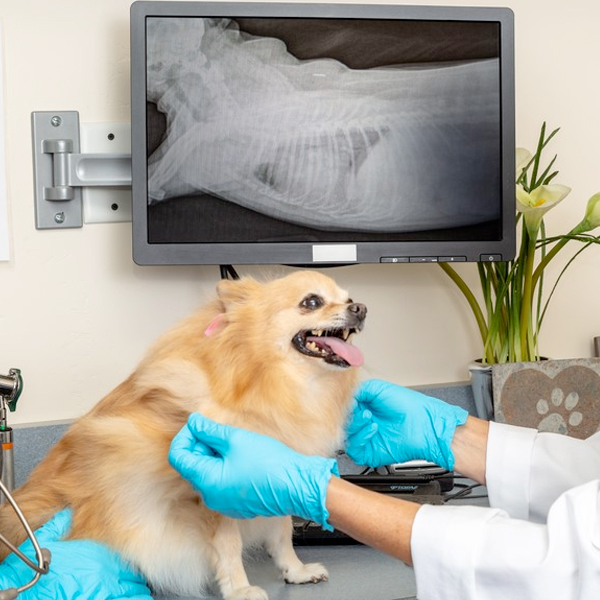Dog Radiographs and Ultrasound Back
At Burford Veterinary Hospital, we have a radiology suite equipped with a digital X-ray machine. With this technology, we get high quality images within seconds.
Radiographs are performed for several reasons. They are an important diagnostic tool to view the body structures including hard tissues (bones) as well as organs. Some soft tissues are not well defined on radiographs, and radiographs are only two-dimensional so may not be the diagnostic imaging tool of choice in all cases. Some cases where radiographs can be particularly helpful include:
- Confirm pregnancy (as well as number of puppies)
- Limping/lameness concerns (assess bones and joints)
- Concern of organ enlargement
- Concern of thoracic or abdominal masses
- Fluid in the thorax or abdomen
- Heart disease (size of heart, chamber enlargement, fluid, etc.)
- Coughing (primary, secondary and tertiary airway)
- GI concerns (radiopaque foreign material or gas pattern changes, GVD, megacolon, etc.)
- Concern of bladder stones
- Concerns with spine (IVDD, spondylosis, etc.)
- Post operative orthopedic surgery
The veterinarian may assess the radiograph themselves or may elect to send them to a board-certified radiologist for interpretation. This yields a detailed report assessing the radiographs and the pertinent case information regarding your dog. From there, the veterinarian will discuss the findings with you, and possible next steps.
There are times when we require sedation to perform radiographs, which include some orthopedic radiographs (to successfully capture specific angles) and patients who do not tolerate the required positioning for radiographs.
In the case sedation is required, your pet will need to be fasted and spend some time recovering in hospital after the procedure.
As for ultrasound, we use a travelling ultrasound service that comes to the clinic upon request to perform imaging. These images are assessed by a specialist, who sends us a report with their findings.
Ultrasounds can be particularly helpful in a number of cases. Some include:
- Heart disease
- Concern of organ enlargement
- Concern of thoracic or abdominal mass
- Fluid in the thorax or abdomen
- Concern of bladder stones
- GI concerns (ulceration, foreign material, tumours, etc.)


